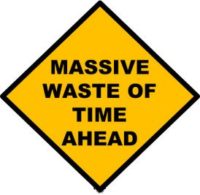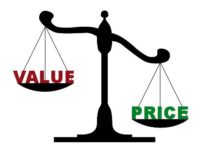In the sales cycle for a technology solution, a vendor typically demonstrates its product, lists its features and benefits and finally gets into price discussions. And a typical technology solution buyer goes along with this sequence of activities.
However, there are prospects who want to know the price upfront. According to this report, they could constitute 58% of the B2B technology market.
If you want your sales to dodge the price question until its due stage in your normal sales cycle, check out this blog post for tips on how to steer the conversation to value.
However, the really important question is, should you? That is, should your sales dodge the price question if it crops up prematurely?
To answer this question, it’s important to understand why some prospects raise the price question upfront. In my experience, this happens when a prospect wants to quickly:
- Check whether they can afford your price (“affordability”)
- Assess fitment of your price with their budget (“expendability”)
There’s no major difference between affordability and expendability in B2C since individuals tend to buy only one big-ticket item at a time.
However, a company buys multiple big-ticket items simultaneously. Affordability is a measure of how much money a company is able to spare for the given item regardless of ROI, cost of other items and any other considerations; whereas Expendability is a measure of how much money the company wishes to spend for the given item mindful of ROI and competitive costs. Therefore, there’s a big difference between affordability and expendability in a B2B setting.
By steering the conversation to value, it’s quite possible that some prospects who inquire about price might be impressed enough with your value proposition to increase their budget. However, that’s a long-drawn out process in most enterprises, involving finance and other stakeholders. Until the budget has actually risen to your product’s price point, your sales will reject the lead as being BANT-unqualified (Although sales might hasten its own demise by sticking to outdated concepts like BANT, many companies still use such qualification criteria). For most prospects, though, no amount of value selling will help them magically generate the cash they don’t have to buy your product.
Therefore, you’re unlikely to convert such prospects. You may be better off quoting your ballpark price to them and moving on to the next prospect in your target lead list. Ducking the price question is not a great idea with this segment of the market.
 I experienced this as a buyer when I helped a customer purchase a market intelligence software recently.
I experienced this as a buyer when I helped a customer purchase a market intelligence software recently.
The inside sales rep of a leading vendor in this category kept chasing me for an appointment to demo his product. Everytime I asked him about the price of his software, he steered the conversation to value. Since I happened to know his company’s CTO, I acceeded to his request for demo without insisting on having a feel for the price.
Proved to be a waste of time for both of us.
After the demo got over, I repeated my oft-asked question about price. This time the rep gave me a straight answer. It was in $$$$$. There was no way my customer could spare that kind of cash, no matter how much value the product delivered. Ergo, there was no chance of this sale happening.
Had the rep indicated a price range for his product in the beginning of our interactions instead of ducking my price question repeatedly, we could’ve saved each other a lot of time.
Eliminate wasted meetings by boldly asking, "What is your budget so that I may tailor what we have to what you need?" #sales #goals
— Elinor Stutz (@smoothsale) July 24, 2016
Therefore, in most cases, it’s better to get the price question out of the way as soon as your prospect raises it.
Let me hasten to clarify that this guidance is ONLY applicable when the prospect raises the topic of price upfront.
In all other situations, price discussions should take place at the customary later stage of the sales cycle.

